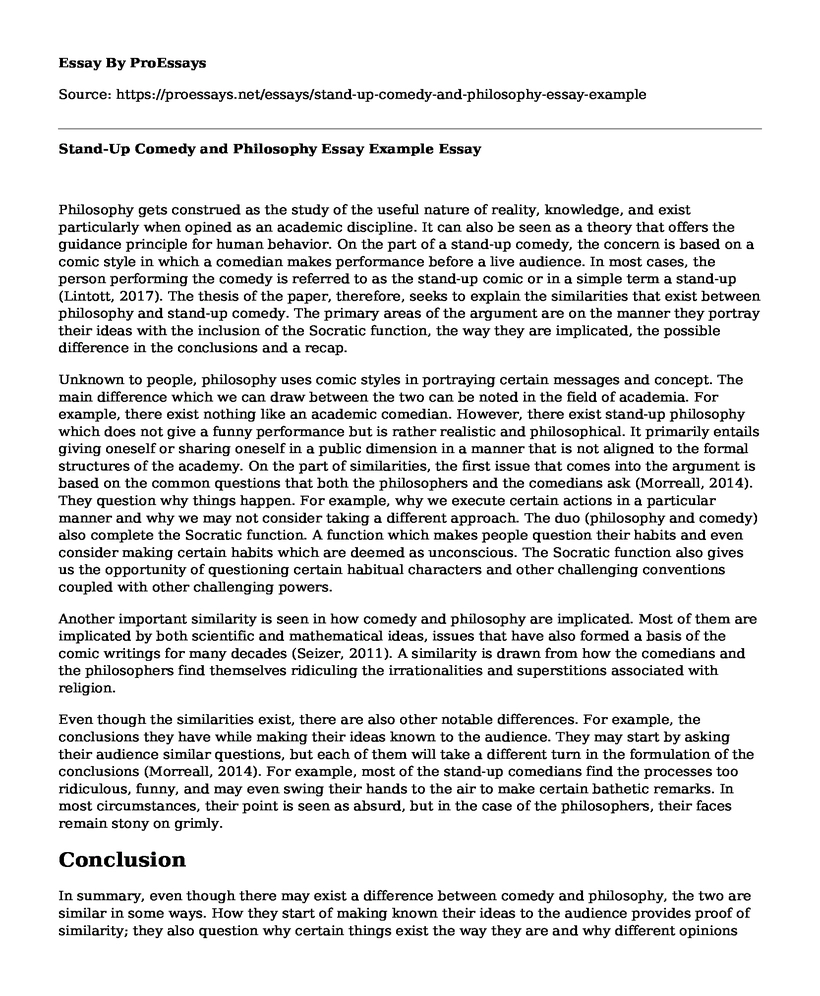Philosophy gets construed as the study of the useful nature of reality, knowledge, and exist particularly when opined as an academic discipline. It can also be seen as a theory that offers the guidance principle for human behavior. On the part of a stand-up comedy, the concern is based on a comic style in which a comedian makes performance before a live audience. In most cases, the person performing the comedy is referred to as the stand-up comic or in a simple term a stand-up (Lintott, 2017). The thesis of the paper, therefore, seeks to explain the similarities that exist between philosophy and stand-up comedy. The primary areas of the argument are on the manner they portray their ideas with the inclusion of the Socratic function, the way they are implicated, the possible difference in the conclusions and a recap.
Unknown to people, philosophy uses comic styles in portraying certain messages and concept. The main difference which we can draw between the two can be noted in the field of academia. For example, there exist nothing like an academic comedian. However, there exist stand-up philosophy which does not give a funny performance but is rather realistic and philosophical. It primarily entails giving oneself or sharing oneself in a public dimension in a manner that is not aligned to the formal structures of the academy. On the part of similarities, the first issue that comes into the argument is based on the common questions that both the philosophers and the comedians ask (Morreall, 2014). They question why things happen. For example, why we execute certain actions in a particular manner and why we may not consider taking a different approach. The duo (philosophy and comedy) also complete the Socratic function. A function which makes people question their habits and even consider making certain habits which are deemed as unconscious. The Socratic function also gives us the opportunity of questioning certain habitual characters and other challenging conventions coupled with other challenging powers.
Another important similarity is seen in how comedy and philosophy are implicated. Most of them are implicated by both scientific and mathematical ideas, issues that have also formed a basis of the comic writings for many decades (Seizer, 2011). A similarity is drawn from how the comedians and the philosophers find themselves ridiculing the irrationalities and superstitions associated with religion.
Even though the similarities exist, there are also other notable differences. For example, the conclusions they have while making their ideas known to the audience. They may start by asking their audience similar questions, but each of them will take a different turn in the formulation of the conclusions (Morreall, 2014). For example, most of the stand-up comedians find the processes too ridiculous, funny, and may even swing their hands to the air to make certain bathetic remarks. In most circumstances, their point is seen as absurd, but in the case of the philosophers, their faces remain stony on grimly.
Conclusion
In summary, even though there may exist a difference between comedy and philosophy, the two are similar in some ways. How they start of making known their ideas to the audience provides proof of similarity; they also question why certain things exist the way they are and why different opinions and ideas cannot explain them. The question of the Socratic function also came into context with the basic arguments being derived on the questions that arise - for example, the challenging powers, the challenging conventions and looking at certain unconscious habits.
References
Lintott, S. (2017). Why (not) philosophy of stand-up comedy?
Morreall, J. (2014). Humor, philosophy, and education. Educational Philosophy and Theory, 46(2), 120-131.
Seizer, S. (2011). On the uses of obscenity in live stand-up comedy. Anthropological Quarterly, 84(1), 209-234.
Cite this page
Stand-Up Comedy and Philosophy Essay Example. (2022, Dec 05). Retrieved from https://proessays.net/essays/stand-up-comedy-and-philosophy-essay-example
If you are the original author of this essay and no longer wish to have it published on the ProEssays website, please click below to request its removal:
- Effects of Trauma on Children Essay
- Ethics as a Conduct of Life by Using the Socrates Case Paper Example
- Essay Sample on English Stress & Intonation: Enhancing Word Understanding
- Self-Regulation: Achieving Personal Goals Across Cultures - Essay Sample
- Early Traumatic Experiences & Parental Reflective Functioning - Essay Sample
- Essay Example on Growing Older: How Healthcare is Adapting to an Aging Population
- Paper Example on Ageism: Examining Its Prevalence and Effects on Society







